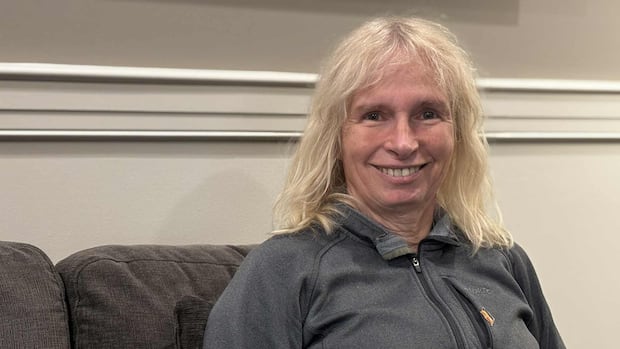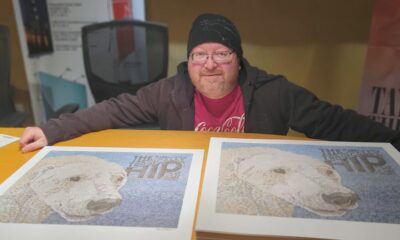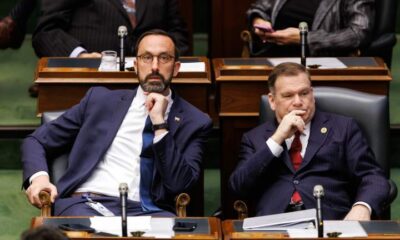Science
Canadian Researcher Rebuilds Study on Trans Athletes After U.S. Funding Cuts

A Canadian researcher has returned to her homeland after facing significant setbacks in her study on transgender athletes due to funding cuts in the United States. Joanna Harper, who has dedicated over two decades to examining the effects of hormone therapy on the athletic performance of transgender individuals, is now seeking to continue her research at Western University in Ontario.
In early 2024, Harper began a five-year research project at a university in Portland, Oregon. The study focused on the fitness performance levels of transgender youth before and after they began hormone therapy or puberty blockers. However, just 18 months into the project, funding was abruptly terminated. Harper attributed this cancellation to a hostile environment for transgender individuals that she believes has been fostered by political decisions following the election of Donald Trump as President of the United States.
“Once Trump got elected, it was certainly understood by all of us that many things concerning trans people in the U.S. were in danger,” Harper explained. She noted that Trump’s administration implemented several policies targeting the transgender community, including an executive order that restricts participation of transgender female athletes in women’s sports.
Harper’s project, a collaboration among four American institutions, was primarily funded by the athletic brand Nike. In the spring of 2024, as federal funding for scientific research faced sweeping cuts, Harper reported that the project was completely scrapped.
Although Nike did not respond to requests for comment, Harper expressed her belief that the political pressure surrounding transgender rights ultimately led to the cessation of her research. “I certainly don’t blame Nike. I blame the people who put political pressure on Nike,” she stated.
Returning to Canada and New Research Opportunities
Faced with the inability to pursue her research in the U.S., Harper returned to Canada and accepted a position as an adjunct professor at her alma mater, Western University. She remarked on the broader implications of the recent political climate in the U.S., stating, “There are all kinds of scientists who suddenly found out that they no longer have positions or funding, and they have headed for the exit. In general, it’s a really disappointing turn that this has happened in the United States.”
In a statement to CBC News, Florentine Strzelczyk, provost and vice-president of academics at Western University, emphasized the institution’s commitment to attracting international talent. In light of recent funding cuts in the U.S., the university has initiated a program to support post-doctoral students from American institutions, offering up to $160,000 over four years.
Future Plans for Research on Trans Athletes
Harper’s interest in studying trans athletes began with her own transition in 2004, during which she observed significant changes in her running speed. “I was running 12 percent slower, and I’m a pretty serious runner,” she recalled. “I had lost my complete male advantage, if you will, within nine months of hormone therapy.”
Despite the challenges of the past year, Harper is determined to resume her research on trans athletes. She acknowledges that the previous project did not yield sufficient data, necessitating a fresh start. While the specifics of her next study are still being finalized, she plans to collaborate with local trans athletes to gather insights on their evolving athletic capabilities.
“I don’t know what the future holds for me, but certainly no trans research will be done in the U.S. until at least 2029, and even then, the future is somewhat fraught,” Harper concluded, underscoring the complexities surrounding transgender research in the current political landscape.
-

 Politics3 weeks ago
Politics3 weeks agoSecwepemc First Nation Seeks Aboriginal Title Over Kamloops Area
-

 World4 months ago
World4 months agoScientists Unearth Ancient Antarctic Ice to Unlock Climate Secrets
-

 Entertainment5 months ago
Entertainment5 months agoTrump and McCormick to Announce $70 Billion Energy Investments
-

 Lifestyle4 months ago
Lifestyle4 months agoTransLink Launches Food Truck Program to Boost Revenue in Vancouver
-

 Science5 months ago
Science5 months agoFour Astronauts Return to Earth After International Space Station Mission
-

 Technology3 months ago
Technology3 months agoApple Notes Enhances Functionality with Markdown Support in macOS 26
-

 Top Stories2 months ago
Top Stories2 months agoUrgent Update: Fatal Crash on Highway 99 Claims Life of Pitt Meadows Man
-

 Lifestyle3 months ago
Lifestyle3 months agoManitoba’s Burger Champion Shines Again Amid Dining Innovations
-

 Politics4 months ago
Politics4 months agoUkrainian Tennis Star Elina Svitolina Faces Death Threats Online
-

 Sports5 months ago
Sports5 months agoSearch Underway for Missing Hunter Amid Hokkaido Bear Emergency
-

 Politics4 months ago
Politics4 months agoCarney Engages First Nations Leaders at Development Law Summit
-

 Technology5 months ago
Technology5 months agoFrosthaven Launches Early Access on July 31, 2025



















